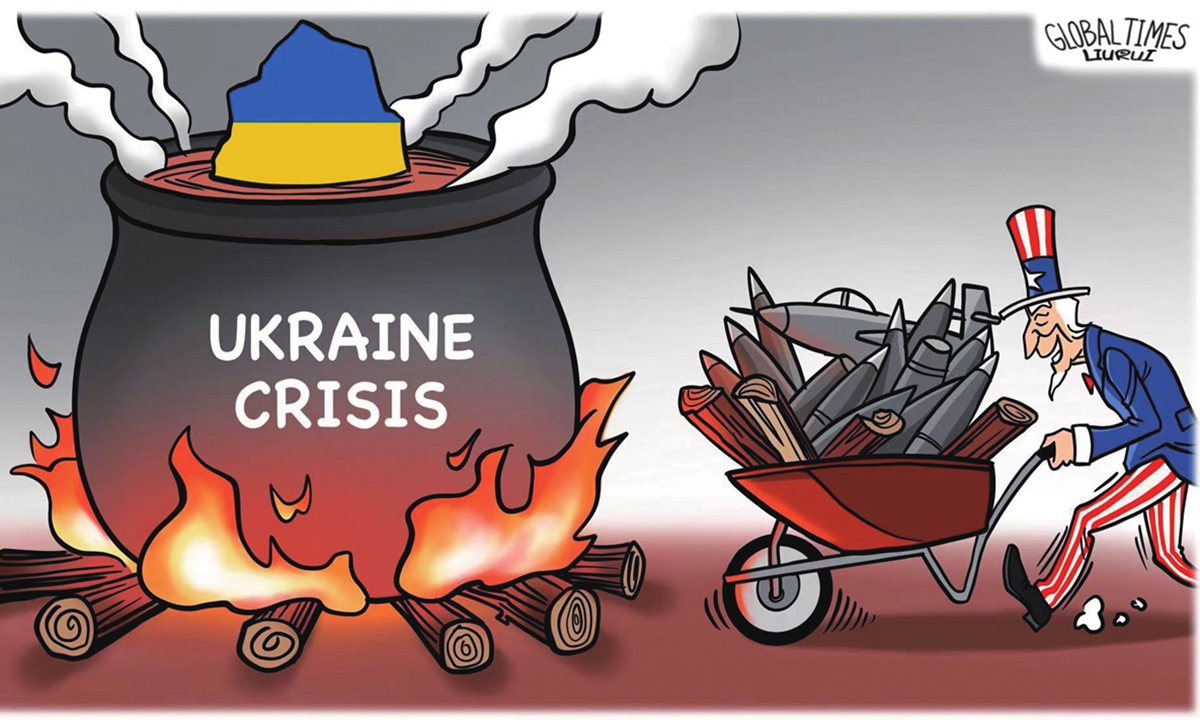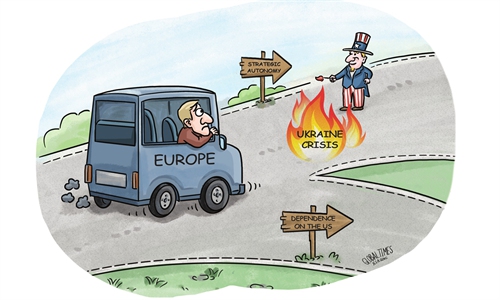US sends Ukraine widely banned cluster munitions regardless of the casualties Ukrainian civilians may suffer

Illustration: Liu Rui/GT
The US announced on Friday that it will provide Ukraine with a new batch of military assistance, which includes cluster munitions. Cluster munitions are now the conventional weapons that pose the gravest danger to civilian populations. Providing them to Ukraine would "potentially be a war crime" - ironically, this is precisely what former White House press secretary Jen Psaki said last year.The Russia-Ukraine conflict has been ongoing for more than 500 days. The US previously refrained from providing Ukraine with cluster munitions, but has now changed its stance. This starkly demonstrates the US' double standards and its propensity to act unilaterally when it serves its own interests.
There are two primary reasons behind the US' decision on cluster munitions. Firstly, Ukraine reportedly has suffered substantial losses since the start of the counteroffensive. It's believed these munitions could help disrupt the deployment of Russian forces on the front lines. In addition, cluster munitions have a larger dispersal area. Therefore, the US is taking this action with an attempt to help the Ukrainian army to gain a favorable position in their counteroffensive.
Secondly, for more than a year the US has dipped into its own stocks of traditional 155 howitzer munitions and sent more than 2 million rounds to Ukraine, creating concerns about eating into American stores. Biden said that the cluster munitions were being sent as a "transition period" until the US is able to produce more 155mm artillery.
In fact, the US developed the cluster munitions during the Cold War and later stockpiled a large number of them, many now nearing the end of their shelf life. So it is not a matter of insufficient howitzers, but rather a necessity to deplete the stock of the US' old cluster munitions. Instead of disposing of these munitions, the decision is made to provide them to the Ukrainian army for use in the battlefield against Russian forces, regardless of the casualties and suffering they may inflict upon Ukrainian civilians.
Currently, 123 countries worldwide have joined the Convention on Cluster Munitions, which prohibits the use of cluster munitions. However, the US is not among them.
Throughout history, the US has extensively used internationally banned weapons, causing humanitarian disasters. It has shown disregard for the grave crimes it has committed against civilians, which fully reflects its war philosophy of utilizing all kinds of ammunitions to secure victory without considering the environment or the civilian population. The US military has employed cluster munitions in Cambodia, Laos, and Vietnam in the 1960s and 1970s, Grenada and Lebanon in the 1980s, Afghanistan in 2001 and 2002, and Iraq in 2003, resulting in extensive damage to civilian infrastructure and numerous civilian casualties. Now, Ukraine faces the risk of repeating the tragedies of countries such as Vietnam, Laos, and Cambodia.
The US provides cluster munitions because it perceives this type of weapon as more effective in neutralizing adversaries. When the US is engaged in overseas conflicts, it is unlikely to prioritize the well-being of foreign civilians or the environmental safety of affected countries. The US primarily focuses on its own interests and disregards the restrictions imposed by international conventions on such weapons. Its actions reflect a manifestation of hegemonic behavior.
Overall, the Russia-Ukraine conflict is already a terrifying situation, and the provision of cluster munitions by the US to Ukraine will only exacerbate the crisis. This move is adding fuel to the fire. The US is prolonging the conflict, when international community are advocating for peace talks.
However, it is important to note that following the US' announcement of providing cluster munitions to Ukraine, several US allies, such as Canada, the UK, Spain, and Germany, expressed their opposition to this decision. Many NATO member countries have signed the Convention on Cluster Munitions, indicating their recognition of destructive inhumane nature of cluster munitions. Even NATO Secretary General Jens Stoltenberg emphasized that NATO does not hold a unified stance on cluster munitions. Consequently, the US will not receive a unanimous response from NATO on this matter.
For the US, providing cluster munitions to Ukraine comes at a cost. It risks further diminishing its reputation in the international community, and more countries will realize that the US is willing to go to great lengths to pursue its own interests, even if it means disregarding the interests of its allies. This includes its supposed ally, Ukraine, as the use of cluster munitions will bring immense suffering to the Ukrainian people.
The author is a Chinese military expert and TV commentator. opinion@globaltimes.com.cn

